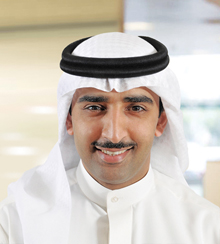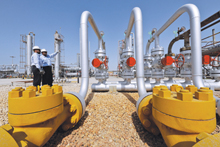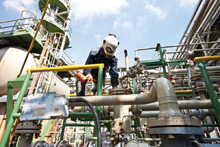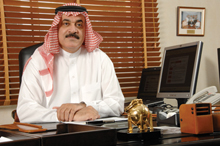
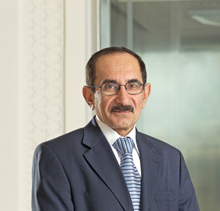 Almoayyed ... carrying on with the modernisation of the refinery
Almoayyed ... carrying on with the modernisation of the refinery
BAPCO will embark on behalf of Noga an ambitious onshore exploration drilling programme to explore and appraise conventional and unconventional potential resources this year, says Bapco chairman Adel Almoayyed.
“Also, Bapco will plan, on behalf of Noga, a new exploration bid round to promote a number of offshore blocks. Interested international oil companies will be invited to attend data rooms in order to participate in the offshore exploration activities,” he says in an exclusive interview with OGN.
“Year 2014 continues to be a challenging year for Bapco. The first half of the year will be dominated by planned process unit maintenance activities, which include change-out of catalyst in our hydrocracker, followed by the largest ever shutdown maintenance project related to our diesel hydrotreating complex as well as #4A crude unit and #5 vacuum unit,” he says.
“In addition, we expect to complete our LPG treating project by July 2014, as well as the $30 million modification project to our #3 sulphur recovery unit. Both these projects will improve environmental performance and reliability of the refinery,” Almoayyed says.
Excerpts from the interview:
What were the highlights of Bapco’s performance in 2013?
2013 was a very challenging year for refiners, especially in the Middle and Far East. Refining margins were very tight, and new refining capacity which came on stream in the region created further competition in a seemingly balanced market. On this basis, Bapco continued to perform well, and probably better than average. A few performance highlights are as follows:
• Achieved the highest average monthly crude run of 271.8 thousand barrels per day (bpd) in January 2013, surpassing the record set in November 2011 of 271.3 thousand bpd;
• The refinery also exceeded target monthly crude run through most of the months, achieving in 2013 the highest delta above annual target over the last five years, and exceeding the annual business plan by over 3 million barrels. This is a reflection of good on-stream factors and reliability;
• In Q1 2013, the company completed a critical activity of hydrotesting the AB crude pipeline from Saudi Arabia, the major feed source for Bapco Refinery. This was managed effectively through team work and careful planning with Aramco counterparts, and conducted safely and in a shorter period of time while maintaining the required crude rate at the refinery;
• The Waste Water Treatment Plant (WWTP) Project has been implemented as part of Bapco’s Environmental Strategic Plan in line with the requirements laid down by the Supreme Council for the Environment at a total cost $120 million. The new plant will provide secondary treatment to the refinery waste water that is received from the existing primary treatment facility. The WWTP is based on 4-stage Membrane Bio-reactor Technology and will be the first global installation of this size in any refinery waste water treatment facility. With this project, Bapco and Bahrain have been put on the world map for using innovative technologies in environmental conservation; and
• In April 2013 we also inaugurated our new $108 million Steam Turbo Generator (STG) project, which involved the installation of two 10 MW steam turbo generators, replacing older equipment which had reached its end of life. This project will increase the energy efficiency of the refinery power generation, and hence reduce operating costs.
These achievements were a culmination of the high performance in operation and improved availability of process units. This is a tribute to the dedication of the entire workforce. Through focus on safety, the environment, clear communication, visible leadership and supply chain management, Bapco continues to deliver superior results.
The company’s focus on its strategic plan has enabled it to concentrate on things that matter and allows the company to demonstrate that it is a true pacesetter in the industry.
The management is committed towards achieving excellence in all its operations and bolstering its status amongst leading oil refineries worldwide.
What contributions did Bapco make to the national economy of Bahrain during the year?
Bapco continues to be the main contributor to the national revenues and considering oil and gas revenues continues to provide over 70 per cent of the national GDP.
Hence all successes or accomplishments mentioned above by the company, leading to improved profitability, therefore directly contributes to the country’s economy.
The company places highest priority in protecting people and environment. During the past few years it has embarked on putting in place an Operational Excellence Management System which translates Bapco business into quality standards and procedures that guide daily operations.
It helps the company identify and manage operational risks while creating value for its stakeholder, the government of the Kingdom of Bahrain.
Better reliability of the Bapco refinery allows the company to maximise utilisation of its assets that results in increased revenue generation for the kingdom. In 2013, we had a relatively reliable year, which ensure that we maximise revenues.
We also demonstrated commitment to our corporate responsibility of not only providing revenues for the nation’s economy but also ensuring that the environment it operates in is protected and preserved.
Monitoring of our environmental performance showed marked improvement in the last two years, and this will be further enhanced with the commissioning of the STG and WWT projects.
The company also supports training, not only for our employees but also for the local community. Bapco focuses on training people so they can obtain the skills that enable them to compete for better and higher paying jobs. Bapco actively participates in the Injaz programme which educates national students and allows them to decide on careers to pursue in the future.
Bapco organises and encourages visits from schools and other institutions to learn from the company’s in-house programmes/systems in areas of safety, health and operation.
We also have strong links with BTI and other training institutions, providing summer training and apprentice schemes, and providing industrial training to scores of students.
It should also be noted that Bapco actively participates on the organising and technical committees of various conferences, attracting such events to the Kingdom of Bahrain, and creating a highly technical forum and environment within the kingdom.
Numerous major conferences were held this year, which adds to the Bapco knowledge based learning, as well as the economy through visitors from overseas countries.
 |
Bapco is building a refinery for the future |
Bapco’s contribution in engaging the local contracting community in the kingdom with special emphasis on work for the development of the small and medium size contractors is also helping the economy and offering of employment opportunities for Bahrainis.
What is the current status of Bapco’s modernisation programme? What is the timetable set for the modernisation to be complete?
Driven by the aspiration to remain competitive and continue its traditional role as a key contributor to the national economy, Bapco has completed a feasibility study for its Bapco Modernisation Programme (BMP) aimed at developing an optimum refinery configuration that would place Bapco among the most competitive and profitable refineries in the region beyond 2018.
The indications from this study, as well as other supporting analyses, have established that the best case for Bapco to improve gross margins is to concentrate on middle distillates production at an increased refinery capacity with bottom-of-the-barrel conversion units to reduce or eliminate fuel oil.
Moreover, this modernisation programme is absolutely imperative to ensure Bapco’s long term viability as a refiner and as a primary provider of revenues to the national economy, in addition to providing continuing employment opportunities to Bahraini citizens.
What are the key elements of the Refinery Master Plan? How will it help in establishing Bahrain as a highly competitive global refining hub?
The BMP will increase our refining capacity from 265,000 bpd to 360,000 bpd and also add several new processing units focused on bottom-of-the-barrel upgrade and middle-distillates production.
The final revised refinery configuration post-BMP allows for higher throughput, improved product slate and an increase in gross margins with the objective of ensuring Bapco’s continued competitiveness under a wide range of prices and market scenarios.
Furthermore, the BMP will also aim to improve energy efficiency as well as address all local environmental compliance requirements anticipated in the near future.
In addition, Bapco will be undertaking several other measures related to its ongoing Operational Excellence (OE) programme in tandem with BMP’s development in its approach towards building a refinery for the future that is optimised, reliable, efficient and green. With this, Bapco hopes to further enhance its position as a major competitive refining hub.
What is the timeframe set for the completion of the A-B pipeline from Saudi Arabia to Bahrain? How will it aid Bapco in its future plans?
To supplement the ambitious expansion plans of the refinery, Bapco is currently working in close cooperation with Saudi Aramco to build a new crude oil pipeline to supply Arabian Light Crude from their Abqaiq facility.
This new pipeline will replace the existing network and will have an operating capacity of 350,000 bpd, which is significantly higher than the current transfer rate of 235,000 bpd.
The new crude oil pipeline, currently in its engineering, procurement and construction (EPC) phase, is expected to become operational in 2016, well in time to meet the higher crude throughput requirements of BMP.
What are the projects planned by Bapco for 2014?
2014 continues to be a challenging year for Bapco. The first half of the year will be dominated by planned process unit maintenance activities, which include change-out of catalyst in our hydrocracker, followed by the largest ever shutdown maintenance project related to our diesel hydrotreating complex as well as #4A crude unit and #5 vacuum unit.
In addition, we expect to complete our LPG treating project by July 2014, as well as the $30-million modification project to our #3 sulphur recovery unit. Both these projects will improve environmental performance and reliability of the refinery.
As far as exploration is concerned, Bapco will embark on behalf of Noga an ambitious Onshore Exploration Drilling Programme to explore and appraise conventional and unconventional potential Resources.
On the other hand, Bapco will plan, on behalf of Noga, a New Exploration Bid Round to promote a number of Offshore Blocks.
Interested International Oil Companies will be invited to attend Data Rooms in order to participate in the Offshore Exploration activities Some of the major engineering projects that are being progressed are:
• Replacing low sulphur fuel oil (LSFO) complex substation at a cost of $47 million – A new substation building having blast resistant, elevated type construction. Two new power feeders, cables to all the existing loads, new switchgear and transformers;
• Enhancing fire fighting facilities at refinery and Sitra at a cost of $30 million in three years – Enhance fire water system at refinery and Sitra tanks to 9000 USGPM and 15000 USGPM capacity respectively based on latest Chevron/NFPA standards. New fire water pumps and piping network will be installed as part of this project; and
• Replacing joy air compressors at #2 power plant: $15 million – Two new 2,300 scfm instrument air compressors (centrifugal type, motor driven), along with two air driers and auxiliaries to replace the existing joy compressors.
How is Bapco’s commitment to innovation and investment adding value for Bahrain?
Bapco has an 80 year history, and the refinery may look old, but it is brimming with the latest technology and techniques.
Bapco prides itself on employing state-of-the-art commercially proven technology. This ensures that Bapco is a recognised leading player both regionally and internationally. Application of this leading technology ensures that Bahrainis develop both personally and professionally.
Examples like the WWTP also increase the image of Bapco on a world scale, as we are now the first refinery to employ bio-reactor technology with membranes in the world.
In addition, the temperature and water salinity conditions make the operating regime very severe, which demonstrates to the world the strength of the knowledge and skill set of Bahrain. This attracts further opportunities to the Kingdom of Bahrain.
What levels of cooperation do you see between Bapco and UAE’s Emarat?
We have a reasonable relationship with all GCC NOCs especially the UAE. We do exchange information related to operational issues on regular basis and attend their functions and training courses regularly. We are also a strong supplier of petroleum products (jet, gasoil, fuel oil and asphalt) to the UAE. In fact UAE is one of the main markets for our company.
There is still room for strengthening the relationship through making longer term contracts, exchanging products and training.
What role will the recently commissioned $108-million steam turbo-generators play in bringing down operating costs and ensuring safety?
The steam turbo generator (STG) project was successfully commissioned earlier this year. The main success is that the project was completed without major incident or injury and we now have two very reliable STGs in service.
Since commissioning the STGs have operated very reliably and without any issues typically associated with new projects.
This is a testament to strong design, engineering and construction employed, which is managed by a professional and dedicated Bapco team. Multitude of hours and planning that went into preparations paid dividends.
The two new STGs replaced the old five STGs; hence there is an improvement on safety, reliability, availability and maintenance cost. The old STGs had reached their end of life, and maintenance work on the machines was increasing exponentially. There is also a risk with the reliability of older machines, especially from point of very high speed rotating parts.
The new STGs are very safe from this perspective, and additionally the control and protection systems are very modern and sophisticated with built-in vibration, temperature, level, etc alarm/trip systems, with the latest technology being employed to ensure maximum safety and reliability. This is a significant improvement over the older machines. Although we don’t yet have any figures to show for the cost savings; it is anticipated to have savings in both operation and maintenance costs of the new units.
On the maintenance front; in 2013 we had very few maintenance activities carried out on the new units.
Again as a byproduct of having the new salt water strainers serving the new units, we can see that the quality of sea water going to the desalination units has improved drastically; this was one of the factors that had led to the very high cost of restoring our distillate water production. The efficiency of the new units is higher than the gas turbine units and therefore anticipated to be utilised to supply a higher proportion of the demand; especially with gas price increase.
One of the limiting factors with the old units was their slow response to sudden changes in demand and/or faults which often caused them to cascade-trip; potential for LPO, and hence the heavier reliance on gas turbines.
On the steam balance front, the new units are geared with automated systems to handle changes in steam pressure and letdown, again allowing faster response to steam system upsets, and hence improving overall refinery reliability.
 |
Bapco ... a true pace-setter |
What are the salient features of Bapco’s competency framework project?
Bapco has embarked on this project “Competency Framework” to clearly define a road map for new intakes on the different career tracks throughout the stages of his/her improvement so as to ensure that compliance training, right competency and skills are provided to execute the roles and duties. Also, it addresses development for future positions and the preparation of identifying talents for higher positions. Knowledge and skills of Petroskills (training consultant) is being utilised for this purpose.
How will Bapco’s new diesel loading terminal help enhance the natural gas supply in the kingdom and meet the growing demand for diesel in the local market?
The new diesel loading terminal is the perfect solution to many issues:
• It contributed strongly in the batch distribution of diesel on the island, thus reducing the queues in the service station and partially contributed to solving the traffic jams; and
• The diesel requirements are predominantly for the industrial customers where growth in demand is expected in the future. Hence batch supplies will play a major role over the coming years especially with the anticipated economic growth in the region.
Being far away from the cities, the terminal also added a safety factor as it reduces the risk associated with loading small tankers in the crowded areas.
How is Bapco executing the National Oil and Gas Authority’s strategies for promoting value-added industrialisation in Bahrain?
National Oil and Gas Authority (Noga) is primarily responsible for the oil and gas in the Kingdom of Bahrain, and we in Bapco are the biggest operating company under the umbrella of nogaholding Company which is the investment arm of Noga.
The Bahrain 2030 Vision is also clear in reaffirming the growth of the oil and gas sector as the foundation of our future
development.
In addition to Bapco’s various technical projects, which support Bahrain Vision 2030, we engage in oil and gas activities such as drilling and completion of certain prospects onshore to identify potential hydrocarbon presence and to further upgrade our knowledge of these structures.
What are Bapco’s achievements on the safety front? Have you set any targets for 2014?
Bapco’s vision is striving for excellence in all aspects of our business. Nowhere is this more important than in the health and safety of our employees and the contractors who work within our facilities.
We set ourselves very high standards in this regard, and consider the only acceptable workplace is an incident and injury free one. Hence our target in 2013, which is also our target for 2014, is no serious incidents or injuries.
Unfortunately in 2013 we suffered three lost time injuries during which our employees or contractors were injured.
The staff is now back at work, and the related incidents have all been investigated and lessons learned integrated into our processes and practices to mitigate similar events occurring again. These events are a stark reminder about the potential risks of working in the oil and gas business, however we are confident that our goal of an incident and injury free work place is achievable.
To demonstrate this, in 2013 we worked three periods of 3 million manhours without a lost time injury, and hence we know that as we strive for excellence and ensure that we do it safely or not at all, that we can work for longer hours without injury.



















































































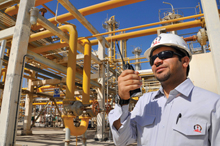
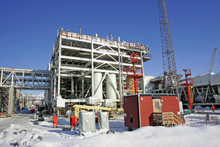
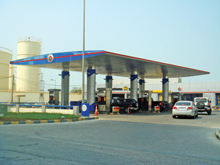
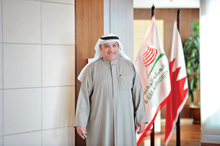
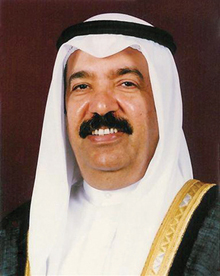
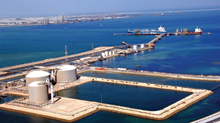
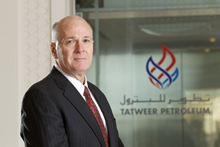
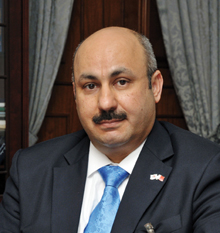
.jpg)
